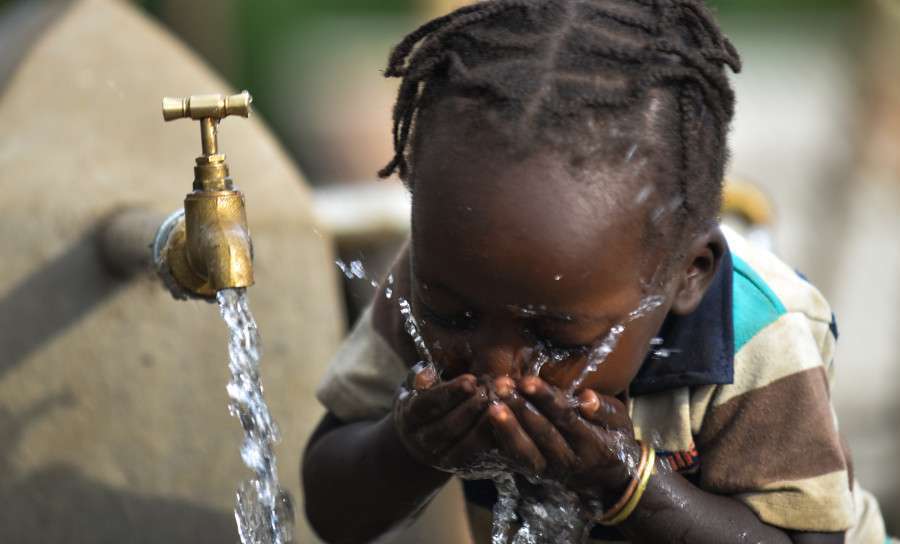
World Water Day highlights the importance of safe water and actions to tackle the global water crisis. To celebrate, we sat down with Petros Birhane, DT Global’s Chief of Party for our USAID Lowland Water, Sanitation, and Hygiene (USAID Lowland WASH) Activity to learn more about how the Activity is building the capacity of local Water, Sanitation, and Hygiene Committees to deliver safe and sustainable water to pastoralist communities.
Ethiopia’s flood and drought prone Lowlands are remote and fragile. In addition to lagging social and economic indicators, the largely pastoralist communities face water and sanitation access that is well below the national average.
In these regions, the Government of Ethiopia sees Water, Sanitation, and Hygiene Committees (WASHCOs)—local, voluntary committees that manage a community water system—as essential partners with the local government and private sector to ensure that national water targets are met. Ethiopian WASHCOs do a number of things for their communities: ensure water points provide safe water in adequate quantities for the community; collect water tariffs and deposit revenue at government-endorsed financial institutions; employ staff to work on water systems; and collaborate with Woreda (District) Water Offices on management, operations, and maintenance of the water system. Though WASHCOs can manage regular water scheme operation, challenges with major maintenance needs such as replacement of broken generator or pump parts often require external support from the local government or private sector.
WASHCOs often face serious limitations—lack of management skills, legal recognition, financial management ability, accountability to customers, or procurement capacity—that limit their ability to fully perform their responsibilities. One of the strategies of the Government of Ethiopia to improve water point functionality is to privatize operation and maintenance of water points. While full private operation is a distant goal (especially in Ethiopia’s Lowlands, where the risk is greater than the return), short- and medium-term ambitions seek to introduce private sector elements into WASHCOs in order to slowly professionalize them. Implemented by DT Global, the USAID Lowland WASH Activity has worked to professionalize WASHCOs and pave the way for increased private sector engagement.
To professionalize Ethiopia’s WASHCOs and get them ready for market engagement, they need to meet several prerequisites identified by Aguaconsult and WaterAid. These include operating as a recognized management entity for a given water scheme, day to day control and oversite of said scheme, clear asset ownership, capacity and ability to contract with private sector operators and suppliers, and tax revenue that covers recurrent scheme costs.
Through our work in this space and our familiarity with the local communities, the USAID Lowland WASH Activity has identified several challenges that WASHCOs face as they professionalize, including ineffective operationalization of institutional roles, inefficient financial management, and incomplete cost recovery. At the same time, we found that WASHCOs have some strengths that they can capitalize on, including clear and respected tariff regimes that set tariffs based on cost recovery principles; established saving bank accounts; ability to identify and delegate critical service functions to Woreda Water Offices, entrepreneurs, or local companies; and clarity around asset ownership and related responsibilities—four areas defined as critical market entry prerequisites.

To support the professionalization of WASHCOs, we began by conducting rapid assessments of the strengths and weaknesses of 130 committees in Ethiopia’s Lowlands. These assessments covered membership, the roles and influence of women, and the status of WASHCO finances and savings. Next, we used our findings on finances and savings as proxy indicators of management performance and compared this indicator for each WASHCO with national averages available to give us a picture of performance.
Following our assessments, we worked with WASHCOs to separate service and operational functions so that they could delegate some of the critical service functions to Woreda Water Offices or the local private sector and establish personnel skills to move from volunteerism to professionalized delivery. We also worked with them to strengthen performance management and business practices, including tariff collection, and promote customer service and accountability.
To date, the Activity has supported 130 WASHCOs in Ethiopia’s Lowlands. To measure the success of newly professionalized WASHCOs and the growth of private sector market opportunities for companies and private individuals, our program focused on WASHCO financial management and savings. Cash on-hand in a bank was used as an indicator that a WASHCO had balanced expenses with tariff revenue and was prepared to pay for services that it could not provide internally. Similarly, cash on-hand in a bank would serve as a concrete enticement to private sector actors that reliable income was possible through servicing the unmet needs of WASHCOs at a profit-making scale of opportunity.
Our assessment found that the Activity’s support established a foundation for the private sector in 11 of 19 water schemes[1] across three regions, as indicated by effective financial management. After Activity support, 18 had a core tariff in place for domestic water collection; functioning, transparent mechanisms to tailor the tariff to the needs of marginalized populations; and transparent communication of financial matters to consumers. In total, 11 WASHCOs had established bank accounts and had cash available; 12 had received more in monthly revenue than was needed for operating expenses. These examples of improved management, increased cash reserves, and better service delivery are exactly the kinds of things Ethiopian WASHCOs need to increase demand and open opportunities for expanded private sector engagement.
[1] Lowland WASH Activity, WASHCOs Performance Assessment (in preparation)